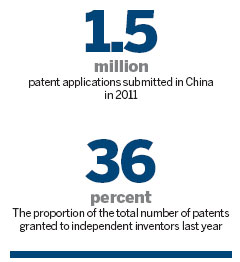Profitable inventions
After testing his ark on Aug 6, Yang's two cellphones rang nonstop. He was getting 50 calls a day about the vessel. One businessman calling from Shanxi province wanted to order 15 arks.
Yang said he plans to change the design, make the vessel smaller and more affordable. "The ark could shrink to 3 meters in diameter and sell for about 1 million yuan."
He hired a crew of 30 workers for two years to make the craft. It cost him 1.5 million yuan, which he had saved from selling shape-shift scarves he invented - scarves whose design changes depending on how they are folded. Yang was on the road to making his fortune inventing, but it was hard work.
In 2002, after graduating from university, the native of Jiangxi province found a low-paying job as a tourist guide in Guangdong province. Unsatisfied with that, he started a trading business to earn more, but through inexperience lost everything on some bad deals.
|
 |
In May 2004, he went to Yiwu to trade daily commodities. By the next year, he had made only a meager profit, owing to the ferocious competition among local traders. In 2006, he was granted a patent on a new type of zipper.
"The first patent was encouraging, but trying to get it manufactured was so hard," said Yang. Twice he was cheated when looking for investors in neighboring cities. "The fraudsters took my schematic drawing, and that was the last I saw of them," he said.
However, Yang did not give up. Unlike many other young men, he does not play computer games, and he has no hobbies. He studied about 16 hours a day and mastered physics, chemistry and other disciplines. Whenever he came across technical problems with his designs, he would turn to experts, and he wasn't put off by criticism.
Yang's persistence bore fruit a year later when he designed the shape-shift silk scarf. He used all his savings to have the scarves made in 2007. The product was wildly popular with young women. In 2009, his factory had 120 million yuan in revenue.
He now owns three companies, which yield a net income of more than 100 million yuan a year.
Hard to industrialize patents
Yang said 90 percent of his inventions have not gone into production. But Li Rongbiao, 68, was lucky the first time around when he managed to put his patented electric wheelchair into production in 2008.
Hidden amid the cornfields in Beijing's Tongzhou district, Li's bungalow is no different from his neighbors' homes. But it is where he fulfills his dream of building the best possible electric wheelchairs. His wheelchair can climb up and down stairs, a useful feature for people who cannot walk and live in buildings that do not have elevators.
In 2002, his wife Zhao Shuying, 70, was unable to walk for six months after breaking her ankle in a fall on a staircase. The couple then lived in an apartment building with plenty of stairs. Li racked his brain thinking of ways to make a wheelchair so he could bring his wife outside. He got the idea for an electric wheelchair that could climb the stairs in his building while talking with a Japanese friend.
For four years, Li perfected his model, going from three to five wheels to give it better balance. In 2006, he sold his apartment in downtown Beijing for 400,000 yuan to start his business. His wife, Zhao, was against spending their 500,000 yuan savings, and she distrusted the feasibility of the wheelchairs.
Li's two daughters, who live in Los Angeles, were also strongly opposed to his plan. They e-mailed that they would gladly pay for daily needs their parents might have, but not if their father lost everything if his business failed.
"I called every friend and relative in Beijing to tell them all that I would not borrow money from them if my factory was short of funds," said Li. "I told them that if my factory collapses, I'd jump off the roof to kill myself."
In the end, Li's wife stood by him and the couple made their first wheelchair in 2007 in a rented house in Qianzhaifu village. Zhao was the first one to go downstairs in the wheelchair. In 2009, Li recruited nine workers as orders for the wheelchairs grew.
Before setting up his own factory, Li tried to outsource some of the work, but his attempts proved futile. In 2009, he ordered 200 stainless steel pipes from a manufacturer in Haidian district. According to the contract, the manufacturer would deliver the pipes in one month, but Li had to wait for three.
This month, the nine workers in Li's factory have been busy assembling wheelchairs with cushions, wheels, and metal bars that were cut and polished for arm- and backrests. They can make one wheelchair a day, and three within two days during peak seasons, such as the spring.
The wheelchairs cost 9,900 to 13,000 yuan, depending on how expensive the metal bars are. As of July, Li had sold more than 500 and donated a few to disabled friends.
